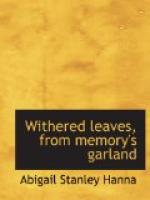Changes
Who has not observed the mutability and ever changing aspect of earthly things? Here, in this pleasant village, where rises the towering spire, the lofty mansion and the humble cottage, with all the varieties appertaining to our village, its numerous factories and pleesant school houses, its well erected bridge over its foaming waters, once the Indian roamed, in untamed freedom, through forests unbroken by the woodman’s axe. Here resounded the fierce war-whoop, and here the wild death song; here was built the council-fire, and here was smoked the pipe of peace; in fine, here on this very spot existed all the elements of savage life. The light canoe was paddled over the roaring stream, that thundered on in its majesty, even as now.
But the white man came and scattered the race, and civilization spread its changes over the scene. Thus society is ever changing; even beautiful cities that have existed in all the pomp of wealth and elegance, have now become extinct, and are covered by the dust of ages.
Man’s life, too, is one constant scene of change, from infancy to childhood, from childhood to manhood, and from manhood to old age. And many are the vicissitudes which await us during our journey through life. One generation passes away to be succeeded by another; we too must change, and when we shall be sought by our friends in our accustomed places, and they shall ask, “Where are they?” Echo shall answer, “Where?”
To Mr. and Mrs. S——, On the Death of an Infant.
The fairest flow’r that blooms on
earth,
And charms the gazer’s
eye,
Is first to lose its brilliant hues,
And fade away and die.
Soft it unfolds its petals rare,
To gentle dew and sun,
But come one blast of chilling air,
And all its beauty’s
gone.
E’en so is life; the glow of health
That warms the youthful cheek,
Seems to invite the tyrant Death,
His helpless prey to seek.
Thy little babe scarce ’woke to
life,
And promised fair to bloom,
Ere cruel Death his victim seiz’d,
And bore it to the tomb.
We fondly watch’d with anxious eye,
For Hope had promise giv’n;
And little deem’d that passing sigh,
Had borne his soul to heav’n.
Calm as the breath of summer eve,
On flow’r and foliage
shed,
And pure as midnight’s heav’nly
dew,
His gentle spirit fled.
Then let not grief for him abide
Within a parent’s breast,
For while his flesh returns to dust,
His soul’s with God
at rest.
When we from earth are call’d away;
By God’s own summons
giv’n,
May we as tranquilly depart,
And be as sure of heav’n.
The Spirits of the Dead.
“Are they not all ministering
spirits, sent forth to minister unto
them who shall be heirs of
salvation?”




